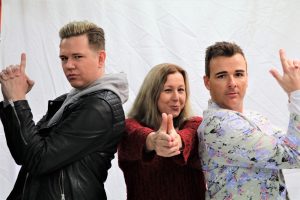Back on Track
Earlier in the year, Maria showed my action script, But the Truth, to a Queensland company. They loved it, so Maria and I flew down to meet with them. Coordinating the meeting was Maria’s friend, Vicky Wanless. Vicky herself is an actress, writer, producer, and director. She’s also, at this time, a Queenslander. Nothing came of the action script, but as we moved forward with Little Diva Rising, Maria brought Vicky onboard.
When we were breaking down roles of who’d do what, a lot (nearly everything) was new to me. The only thing I knew about was writing. I didn’t even know what everybody else was good at. As time went on, our strengths and weaknesses began to predispose who would do what.
One of Vicky’s strengths in preproduction was tirelessly and uncomplainingly coordinating auditions, putting together a budget, and the administration of who was doing what. When we were still trying to fill certain roles, she hand-picked several actors to audition who fit perfectly into what I envisioned. It makes everything so much easier and smoother when you’re with people who are on the same wavelength.
She’s zealous in taking on whatever’s assigned to her and willingly asks for more to do to keep everything moving. It’s good energy to have because (in conjunction with the others) it means there’s constant forward momentum. (In the past, I had been involved at very preliminary stages in similar projects, but on those occasions nobody generated any momentum.)
She’s flown down from Queensland for several weekends of filming (only missing last week because of illness) and, I find, is a good barometer for me. I’m always feeling my way through what I’m doing. Sometimes – as with my writing – I need to go the wrong way to work out what the alternatives are. Vicky’s been good at providing boundaries for me to bounce off (somebody has to do it!) and to upskill me in areas that I’m clueless. That also helps me focus on the story.
Now at the heart of Little Diva Rising‘s story sits the Angelos family: mother Maria (Maria Tevelis), an aspiring actress, who manages her daughter’s career; father Vic (Cam Faull), who manages the struggling family gift store; Ellie (Ellie Tevelis), a nine-year-old actress whose character on an unnamed adult drama inexplicably becomes the most popular character on that show; and little six-year-old brother Charlie (Charlie Tevelis), who struggles to understand all these adult things going on around him.
You might’ve noticed that three members of the family share the same surname – well, that’s because they are family. What better way to show the family dynamic on-screen? And Cam fits in with such familiarity and connectivity, that it’s easy to accept him as the husband/father of the group. With that all functioning, it becomes the bedrock of Little Diva Rising. Everybody in the pilot plays off them.
The great thing with kids is that they’re uninhibited. They don’t mind being silly or sending themselves up, and enjoy being challenged to behave in ways they wouldn’t necessarily behave in real life. Both Ellie and Charlie also have a flair for acting, as well as a precocious understanding of the script. They’ve even been able to recite other characters’ lines whenever there’s been any uncertainty. (I’m constantly consulting the script, having to remind myself what I wrote.)
Ellie, at just nine, has already had a respectable career, and has co-starred in Channel 9’s Bad Mothers. This was the initial inspiration for Little Diva Rising – the question that popped up in my head was, What would happen if a child actress grew so popular her ego spiralled out of control? Ellie already understands her character (and revels in playing a diva – pray for her family off the set), and is able to deftly showcase Ellie’s journey.
I also discovered on Saturday that she’s a fantastic improviser. One scene focused on her parents, with Ellie sitting in the foreground watching something on her iPad. As her parents discussed their issue, Ellie would giggle – as if she was enjoying what she was watching. But there’s another layer to what’s going on which (retrospectively) re-contextualises the scene.
Charlie, at six, is just starting out, but has been able to recite paragraph-long dialogue fluently, as well as physically play out whatever a scene requires. Everything he says is just no natural, and he intuitively knows how to respond to a situation – if he needs to be happy or scared or whatever the scene requires. He fits into the tone and plays off it.
But, as I mentioned, that’s the strength of being a child – kids always live in make-believe, and don’t worry about self-image. They exist in that moment. And that’s what good acting is about: ditching everything that makes you who you are, and existing in whatever moment the story requires as the character you play.